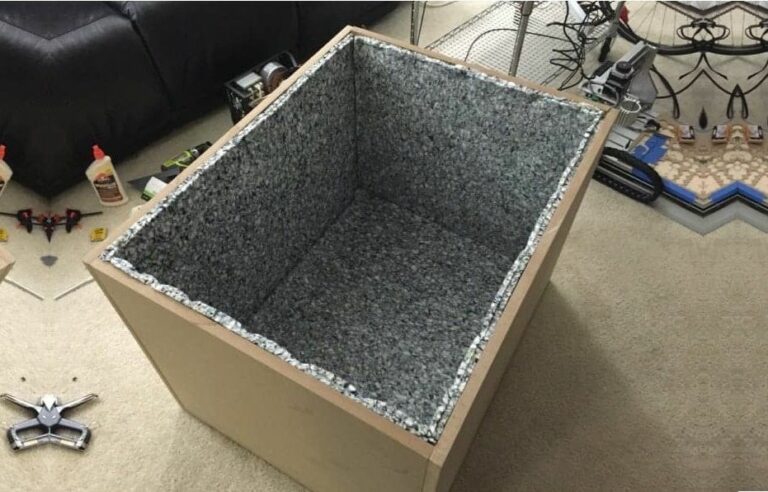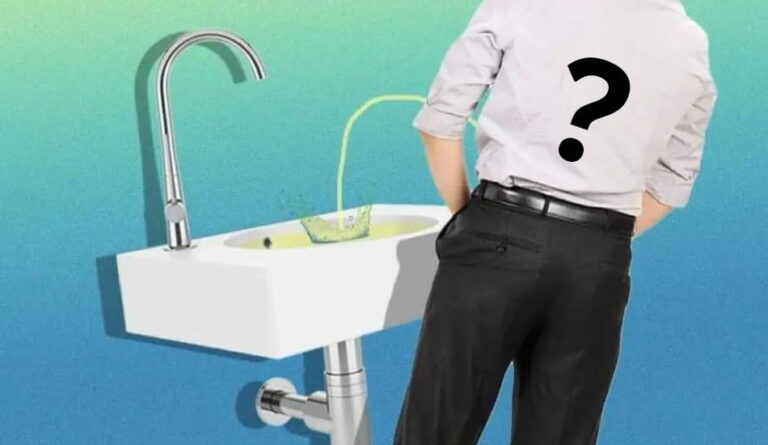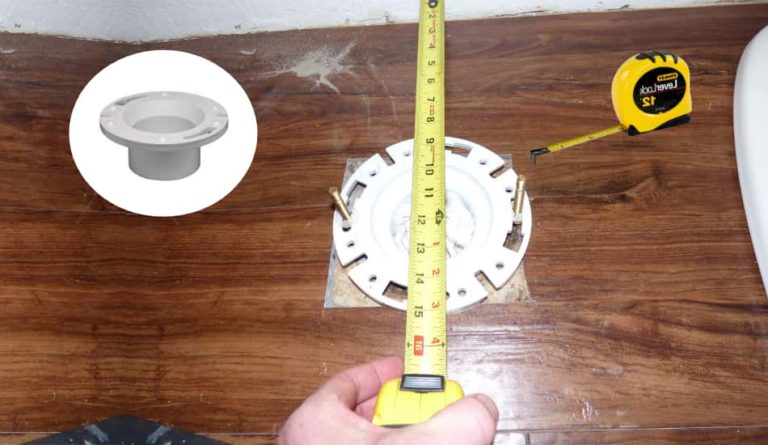Why Does Urine Sinks to Bottom of The Toilet? Explained
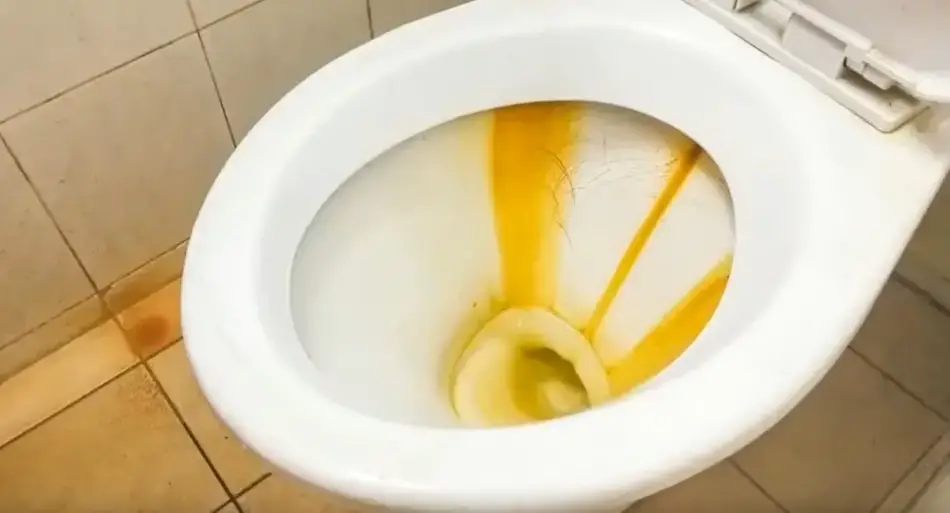
Have you ever noticed that your urine sinks to the bottom of the toilet bowl and stays separate from the water? This occurrence, while not unusual, is something that you may notice while urinating. Sometimes, it might even signal a need for a health check-up. However, in most cases, you should not worry about this. In this article, we’ll explain why urine sinks to the bottom of the toilet. So, let’s start!
Why Urine Sinks to the Bottom of Toilet? Urine sinks to the bottom of the toilet because it is more concentrated, containing dissolved bodily wastes and salts, making it denser than water. This causes urine to descend below the less dense water. This happens when a person is dehydrated, as urine contains a higher concentration of these solutes.
Urine often contains a higher concentration of substances like salts or proteins compared to regular water, which can increase its density. For that reason, urine sinks to the bottom of the toilet. However, it’s unlikely due to high sugar levels, as sugar tends to draw water out, potentially diluting the urine.
The primary reason for the higher density is typically lower water content in the urine, which happens when a person is dehydrated. The concentration of salts makes the urine heavier and causes it to settle at the bottom of the toilet. In the next section, we’ll talk more about this.
Related Article: Does Peeing In The Shower Save Water?
Table of Contents
Reasons Why Urine Sinks to Bottom of Toilet Bowl
If you’ve noticed that your urine sinks straight to the bottom of the toilet, don’t worry. To some people, this might raise some concerns, but it’s often due to a couple of simple reasons, such as lack of hydration or a condition known as proteinuria. Here is what you need to know:
1. Dehydration

When your body doesn’t receive enough water, your urine becomes more concentrated, taking on a darker color and a stronger smell. Under-hydrated urine tends to be heavier than water, so it drops to the bottom of the bowl. While not drinking enough water is the primary cause of dehydration, there could be other reasons your body is dehydrated.
Main reasons for dehydration:
- Climate: During summer, when temperatures are high, your body sweats more than you take fluids into yourself, which can lead to an imbalance if you don’t replace the water you lose. The warmer it is, the more fluid you need to consume to compensate for the loss.
- Health conditions: Several medical issues can lead to water loss in the human body. For instance, diabetes can interfere with kidney processes, or conditions like Cushing’s syndrome can make you feel thirstier because of elevated cortisol levels. Problems such as bulimia or persistent diarrhea can also cause your body to lose more fluids than usual.
- Alcohol: While you might assume that drinking alcohol would keep you hydrated, it actually has the opposite effect. Alcohol acts as a diuretic, prompting your kidneys to remove more water and salts from your body than normal, which means you’ll have to drink more water to make up for this increased loss.
2. Too Much Protein Present in the Urine (Proteinuria)

Another reason why urine might sink to the bottom of the toilet is because of proteinuria. This is when an excessive amount of protein is found in your urine. This can occur if the kidneys are compromised and fail to filter out protein properly, allowing it to pass from the bloodstream into the urine.
The leak of protein migrating from the bloodstream to the urine increases the urine’s weight, leading it to sink to the bottom of the bowl since protein molecules are denser than water.
Causes of Proteinuria
The main reasons proteinuria can be present in the human body are dehydration, kidney damage, or high blood pressure.
- Dehydration: A potential reason for an increased amount of protein in the urine is intense dehydration. When the body lacks enough water, it struggles to carry nutrients, including proteins, to the kidneys for filtration. Consequently, the kidneys may fail to reabsorb these proteins effectively, leading to their presence in the urine instead.
- High Blood Pressure: Over time, high blood pressure can lead to damage or stiffening of the kidneys, compromising their ability to purify the blood and reclaim proteins. In certain people, factors like hereditary traits, excess body weight, obstructive sleep apnea, chronic stress, and smoking habits can contribute to elevated blood pressure.
- Chronic Kidney Disease: Progressive loss of kidney function defines chronic kidney disease (CKD), which can lead to an early presence of protein in the urine, known as proteinuria, even though it often doesn’t produce obvious symptoms initially. As CKD advances, symptoms such as difficulty breathing, the need to urinate often, persistent hiccups, and a general feeling of tiredness may occur.
What to Do If Your Urine Sinks to Bottom of Toilet
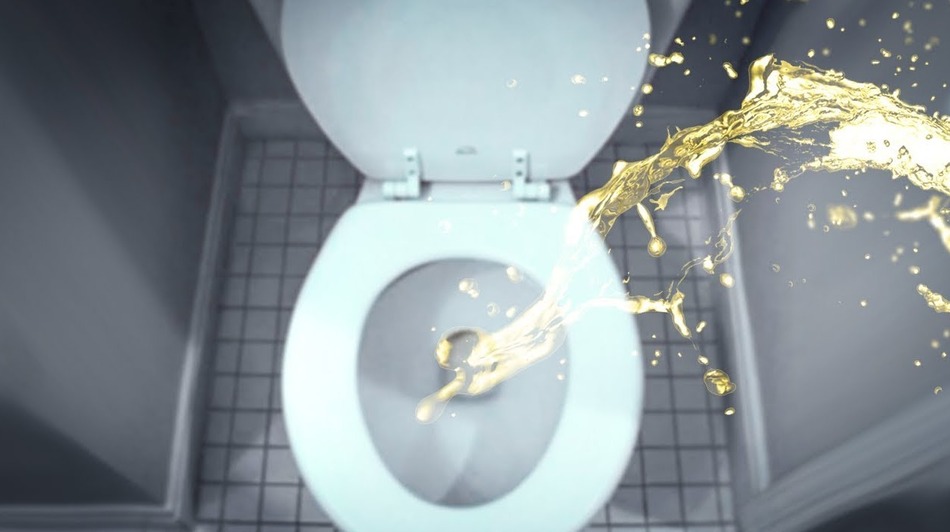
When you notice that your urine sinks at the bottom of the toilet bowl, it indicates that your body needs water. To address this, there are a few actions you can take, depending on how serious the situation is and what you can do about this. Here is what you can do:
- Boost Fluid Consumption: If your urine appears darker and more concentrated than usual, the simplest solution is to consume more fluids. Drinking ample water is key, but you can also hydrate by consuming fruit juices or herbal teas.
- Consult with a Doctor: If there’s a persistent issue with dense urine that doesn’t improve with adding more fluid into your body, it’s important to consult a healthcare professional. Persistent heavy urine can be a symptom of more serious health issues, such as a urinary tract infection or renal conditions, which require professional medical evaluation.
Related Article: Can I Pee In the Bathtub? Plumber Explain
FAQ: People Also Ask
What does it mean when my pee sinks to the bottom?
If your urine sinks to the bottom, it’s a normal occurrence. It happens because your urine gets more concentrated and heavier when you haven’t been drinking fluids overnight, making it sink.
Why is my pee denser than water?
Your pee is denser than water because it has solutes and waste products that your body is getting rid of. This makes the specific gravity of urine higher than that of pure water, which is exactly 1.000. The specific gravity changes with the amount and type of solutes in your urine.
Final Thoughts
In conclusion, urine that sinks to the bottom of the toilet is often a sign of its density, usually a result of dehydration or the presence of excess protein. Ensuring adequate hydration can typically prevent urine from becoming overly concentrated and heavy. It’s also important to watch out that your body has enough proteins, which can indicate kidney issues.
If changes in diet and hydration don’t alter this condition, or if other symptoms are present, it’s advisable to consult with a healthcare professional. Lastly, observing the behavior of urine can be an early warning system for one’s health, signaling when to take action or seek medical advice. I hope this article has helped you, and if you have more questions, feel free to comment below.



